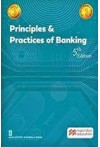- Author(s): IIBF
- Publisher: Macmillan India Ltd
- Edition: 5 Ed Rp 2021
- ISBN 13 9789387687240
- Approx. Pages 830 + Contents
- Format Paperback
- Approx. Product Size 24 x 18 cms
- Delivery Time 3-5 working days (within Kerala & South India) (Others 7-9 days)
- Shipping Charge Extra (see Shopping Cart)
For JAIIB / Diploma in Banking and Finance Examination
............................................................................................................................
Description
This book is intended to be an introduction to Indian banking and touches on almost every aspect, from the Indian financial system to contemporary issues and developments in the banking & finance industry. This book is an aid to understand the nua sol the operational aspects involved in banking. The latest developments in banking including the important areas of emerging technologies and ethics in banking have been dealt with in adeilad detail. The book exhaustively covers the intricacies of financial intermediation, regulatory aspects governing the banking system, marketing aspects of the banking institutions, sources and application of funds in banks, loans and deposits, investment portfolio of banks, statutory reserve requirements, capital adequacy, Basel III norms and lending functions of banks. Established in 1928 as a Company under Section 25 of the Indian Companies Act, 1913, Indian Institute of Banking & Finance (IIBF), formerly known as The Indian Institute of Bankers (IB), is a professional body of Banks, Financial Institutions, and their Employer in India. With a total membership of over 9 lakhs, IIBF is the largest institution of its kind in the world and is working with a Mission "to develop
professionally qualified and competent bankers and finance professionals primarily through a process of education, training, examination, consultancy counselling and continuing professional development programs." During its 93 years of service, IIBF has emerged as a premier institute in banking and finance education for those employed as well as seeking employment in the sector, aiming for professional excellence. Since inception, the Institute has educated numerous members and awarded several banking and finance qualifications, viz., JAIIB CAIIB, Diploma and Certificates covering diverse and contemporary subjects in the banking & finance domains, which have helped the banking & finance professionals to sustain their professionalism through continuing professional development programs.
...............................................................................................................................................
Contents
Module A – Indian Financial System
1. Indian Financial System - An Overview
2. Banking Regulation
3. Retail Banking, Wholesale and International Banking, ADR,
GDR and Participatory Notes
4. Role and Functions of Capital Market, Securities and Exchange
Board of India (SEBI)
5. Role and Functions of Mutual Funds
6. Role and Functions of Insurance Companies, Bancassurance and
Insurance Regulatory and Development Authority (IRDA)
7. Factoring, Forfaiting Services and Off-Balance Items
8. Risk Management and BASEL II - An Overview
9. Alliances / Mergers / Consolidation
10. Credit Information Bureau (India) Limited (CIBIL), Fair Practices
Code for Debt Collection and Banking Codes and Standards Board of India
11. Recent Developments in the Indian Financial System
Module B – Functions of Banks
12. Banker-Customer Relationship
13. Banker's Special Relationship
14. Banking Ombudsman Scheme and Consumer Protection Act
15. Payment and Collection of Cheques and Other Negotiable Instruments
16. Opening of Accounts of Various Types of Customers
17. Ancillary Services
18. Cash Management Services and its Importance
19. Principles of Lending, Working Capital Assessment and Credit Monitoring
20. Priority Sector Advances
21. Agricultural Finance
22. Micro, Small & Medium Enterprises in India
23. Government Sponsored Schemes
24. Self-Help Groups
25. Credit Cards, Home Loans, Personal Loans, Consumer Loans
26. Documentation
27. Different Modes of Charging Securities
28. Types of Collaterals and their Characteristics
29. Non-Performing Assets
30. Financial Inclusion & Financial Literacy
Module C – Banking Technology
31. Essentials of Bank Computerization
32. Alternate Delivery Channel - Digits Banking
33 . Date Communication Network and EFT System
34. Digital Payment Systems - NPCI
35. Impact on Technology Upgradation and Trends in Banking Technology
36. Security Considerations and Mitigation Measures in Banks
Module D - Support Services - Marketing of Banking Services/Products
37. Marketing - An Introduction
38. Social Marketing/Networking
39. Consumer Behaviour and Product
40. Pricing
41. Distribution
42. Channel Management
43. Promotion
44. Role of Direct Selling Agent/Direct Marketing Agent in a Bank
45. Marketing Information Systems - A Longitudinal Analysis
Module E - Ethics in Banks and Financial Institutions
46. Ethics, Business Ethics & Banking : An Integrated Perspective
47. Ethics at the Individual Level
48. Ethical Dimensions : Employees
49. Work Ethic and the Workplace
50. Banking Ethics : Changing Dynamics
Abbreviations
Glossary
Banking Terms
Marketing Terms
Information Technology
Bibliography
............................................................................................................................
Author Details
Indian Institute of Banking & Finance (formerly The Indian Institute of Bankers) was established in 1928. With membership of over 750 institutional members and over 2.5 lac individual members, it is the largest institute of its kind in the world and is working with a mission 'to develop professionally qualified and competent bankers and finance professionals primarily through a process of education, training, examination, consultancy/counseling and continuing professional development programs'. The institute has almost all the banks and financial institutions - public sector, private sector, foreign, cooperative and regional rural banks - as members in addition to IT/BPO companies and individuals working in the banking and finance industry. The Institute offers a number of professional courses in banking and finance and is managed by a Governing Council consisting of Chairmen/CEOs of different banks and eminent academicians. The institute has collaborations with reputed international bodies like Canadian Institute of Bankers; Securities Institute, Australia; World Bank Institute, Washington; American Bankers' Association and The Asian Banker, Singapore and llMs/XLRI, India, for offering courses and CPD programs to finance professionals.
............................................................................................................................

